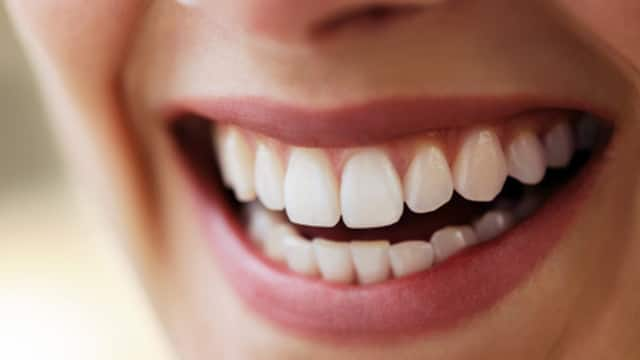What is Tooth Sensitivity?
The Indian Dental Association describes tooth sensitivity as discomfort felt in one or more teeth, triggered by the consumption of hot, cold, sour, or sweet foods or a breath of cold air. It is often felt as a sudden and sharp pain that shoots deep into the nerve endings of the teeth. Often, having sensitive teeth causes mild-to-severe discomfort that may last for hours. It may also signal potential dental problems that require your attention.
What Causes Tooth Sensitivity?
Understanding what causes sensitive teeth could be the first step towards tackling tooth sensitivity. It is worth having a quick understanding of how damage to the tooth structure causes sensitivity. The crown (part of the tooth above the gum line) is covered by a protective layer called tooth enamel, while the tooth roots below the gum line are protected by cementum. Dentin, a less dense structure below the enamel and cementum, contains microscopic channels called dentin tubules that reach the tooth’s nerve centre (the pulp).
Enamel wear-away or damage of the cementum (caused by receding gums) exposes the dentinal tubules. It allows hot or cold stimuli to reach the tooth nerve and cause pain, also known as dentin hypersensitivity. Several factors may cause the enamel and cementum to wear away, making your teeth sensitive. They include:
Gum Recession
Gum recession is one of the most common causes of sensitive teeth. Poor oral health can often lead to plaque or tartar buildup along the gum line. As gums do not have enamel for protection, uncleaned plaque or tartar deposits can cause the gums to recede (shrink back), exposing the tooth roots and causing tooth sensitivity.
Gum Disease
Gum diseases, or periodontal diseases, indicate an infection of the gums and bone supporting the teeth and can often lead to tooth sensitivity. Left untreated, the space between the gum tissues and teeth (pockets) harbour bacteria, causing more severe implications. Untreated gum disease damages the bone and other supporting tissues of the tooth and exposes the tooth roots to various stimuli, resulting in pain.
Cracked Teeth
A cracked or chipped tooth is often painful and sensitive to cold or hot foods and beverages. A crack in the tooth enamel may expose the underlying dentin. Hot or cold stimuli reach and irritate the tooth nerves or pulp through the microscopic tubules of the exposed dentin, causing pain. Bacteria from plaque thrive in broken teeth and may enter the pulp, causing inflammation.
Brushing Too Hard
Toothbrush abrasion is among the other reasons for sensitive teeth. Brushing too hard can wear away the enamel, especially in the regions where the teeth meet the gums and expose the underlying dentin, leading to sensitivity. Adopting proper brushing techniques and using a soft-bristled toothbrush is ideal for preventing sensitivity due to toothbrush abrasion.
Teeth Grinding
Some people may have the habit of grinding or clenching teeth, also known as bruxism. Constant grinding or clenching of teeth can cause the tooth enamel to wear away, exposing the underlying dentin and causing tooth sensitivity.
Plaque Buildup
Lack of proper dental hygiene, including regular brushing and flossing, often leads to the build-up of plaque, a soft, sticky biofilm of food particles and bacteria. If not removed, plaque hardens to tartar. Plaque and tartar along the gum line can cause gum recession and various gum diseases, exposing the tooth roots to multiple stimuli and causing sensitivity.
Acidic Foods
Regular consumption of highly acidic foods and beverages, such as citrus fruits, can wear away the tooth enamel, expose the dentin below, and cause sensitive teeth pain. Rinse your mouth with water after consuming acidic foods or drinks. This helps neutralise the acid and wash away any lingering particles.
Other causes of tooth sensitivity can be recent dental treatment or dental work, such as teeth cleaning, professional teeth whitening, or tooth restoration. In such cases, the sensitivity is temporary and likely to disappear within a few weeks.
When to See a Dental Professional?
Extreme sensitivity to teeth may often indicate a more complex dental problem. Hence, it is essential to consult a dentist for an effective diagnosis and cure. Depending on your unique oral health conditions, the treatment may differ. It may involve the application of fluoride gel, dental crowns, bonding, or procedures to treat gum diseases if found to be the underlying cause.
Meanwhile, a proprietary desensitising toothpaste, such as Colgate Sensitive Plus with Pro-Argin technology, gives instant pain relief right from the first use. It creates a protective calcium-rich layer, seals the exposed channels that lead to the tooth centre, and prevents sudden shocks of pain due to sensitivity. Its fluoride content strengthens tooth enamel and prevents tooth decay and cavities. Brushing twice every day provides long-lasting relief.
In conclusion, understanding the causes of tooth sensitivity is crucial for maintaining oral health. Sensitive teeth cause sudden pain while consuming hot or cold foods and may indicate other dental problems. We've explored various reasons for sensitive teeth, such as gum recession, gum disease, cracked teeth, aggressive brushing, teeth grinding, plaque buildup, and acidic foods. By recognising these triggers, individuals can take proactive steps to alleviate symptoms and preserve their healthy teeth. Regular dental check-ups and consistent oral hygiene habits prevent and manage tooth sensitivity.
Frequently Asked Questions
- What deficiency causes sensitive teeth?
Certain deficiencies can be indirect reasons for sensitive teeth as they weaken the enamel and gums. While calcium strengthens tooth enamel, vitamin D helps the body absorb calcium. Vitamin B12 is essential for healthy gums and prevents gum diseases that may expose tooth roots and cause sensitivity. - What is the fastest way to cure sensitive teeth?
While a dentist can only give effective, sensitive teeth cure, one may ideally use a desensitising toothpaste, such as Colgate Sensitive Plus, for instant pain relief. Its unique Pro-Argin technology builds a protective calcium-rich shield, sealing the exposed dentin tubules responsible for the toothache due to sensitivity. - Can tooth sensitivity fix itself?
Tooth sensitivity following specific dental procedures is temporary and disappears within a few weeks. Sensitive teeth causes can vary from enamel wear-away to gum recession, indicating the importance of proper dental care. Using a desensitising toothpaste or consulting a dental professional is ideal. - How can I get rid of sensitive teeth at home?
Using desensitising toothpaste regularly, such as Colgate Sensitive Plus, helps tackle tooth sensitivity at home. It provides instant pain relief and effectively shields the exposed dentin tubules, preventing sudden pain due to sensitivity. Proper dental care also helps make teeth less susceptible to sensitivity.
This article is intended to promote understanding of and knowledge about general oral health topics. It is not intended to be a substitute for professional advice, diagnosis or treatment. Always seek the advice of your dentist or other qualified healthcare provider with any questions you may have regarding a medical condition or treatment.
ORAL HEALTH QUIZ
What's behind your smile?
Take our Oral Health assessment to get the most from your oral care routine
ORAL HEALTH QUIZ
What's behind your smile?
Take our Oral Health assessment to get the most from your oral care routine











